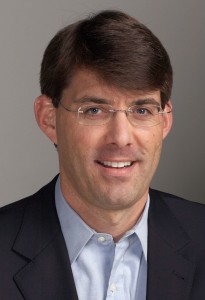Jeffrey Ball Joins the Steyer-Taylor Center for Energy Policy and Finance

Jeffrey Ball, until recently The Wall Street Journal’s environment editor, has joined the Steyer-Taylor Center for Energy Policy and Finance as scholar-in-residence.
The Steyer-Taylor Center is an interdisciplinary initiative of the law school and the Graduate School of Business to study and advance the development and deployment of clean-energy technologies through innovative policies and financial mechanisms. Dan Reicher, formerly of Google, the clean-energy investment ranks, and the U.S. Department of Energy, is the center’s executive director.
Ball’s research will focus on the intensifying race among companies and countries to corner the clean-energy market, and the implications of that race for consumers and the planet. In addition to conducting research, he plans to write articles, convene roundtables, speak publicly, and write a book.
For more than a decade, Ball has been writing for The Journal about energy and the environment, in particular about the economic viability of changing the way the world consumes fossil fuels. He covered the auto industry for the Journal out of its Detroit bureau, and the oil industry from the paper’s Dallas bureau. In 2009, he wrote a Journal column called Power Shift, which won an award from the National Press Foundation for its coverage of the changing energy and environmental landscape. At the Journal too, he helped conceive, and was a host and moderator of, ECO:nomics, an annual conference on energy and the environment, which brings together chief executives, policymakers, and other leaders in the field. In addition, Ball helped host the Journal’s CEO Council, a group of global chief executives who meet annually in Washington to discuss policy issues and make recommendations for federal action. He moderated the CEO Council’s energy and environmental section, which typically includes chief executives from the auto, oil, electricity, mining, manufacturing, and technology industries.
According to Ball, governments and private industry across the globe are reshuffling billions of dollars in a competitive bid to lock up energy resources and to figure out how to use them more cleanly and efficiently. This scramble, he says, is one of the signal economic shifts of our time. It’s why the United States considers recent massive shale-gas discoveries so vital. It’s why the federal government is spending billions to try to reestablish America’s global leadership in the battery, wind, and solar businesses. And it’s why China and other economic powers are heavily subsidizing their own clean-energy-technology industries, which are strategically expanding abroad.
“The Steyer-Taylor Center for Energy Policy and Finance was created to help understand and interpret these enormous global shifts in capital and power,” Ball said. “As a journalist, I’ve written about how the push for cleaner forms of energy is remaking business, affecting consumers, and guiding geopolitics. Now, at Stanford, I’m looking forward to continuing to delve into these issues in a no-nonsense, non-partisan way—and to help shed light on solutions that make economic sense.”
Among the topics Ball plans to research and write about are:
- How the clean-energy-innovation race is reshaping business;
- How current financing and policy mechanisms are succeeding or failing;
- Where private and public money in this area is being well-spent and where it’s being wasted;
- What past energy shifts around the world say about how to facilitate a global energy transition today that’s economically rational.
